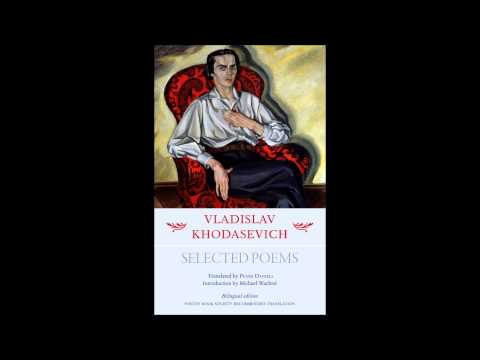The lover of poetry unfamiliar with the work of Vladislav Khodasevich could have no better introduction than this. A detailed introduction by Michael Wachtel, Professor of Slavic Languages and Literature at Princeton, gives a clear cultural and historical context to one of the twentieth century’s more overlooked Russian poets. The bilingual texts are presented with clarity, and the translator’s notes and preface mean that even the most English-bound reader can begin to appreciate Khodasevich’s wordplay and euphony in his own language.
Daniels’ purpose in translation is ‘always to provide a satisfactory poem in English that conveys as much as possible of Khodasevich’s intended meaning’ and to judge his translation as far as I am qualified, I can say that I find his renditions of Khodasevich’s words intensely satisfying. His real love of rhyme is more than respect for the Russian voice he finds himself using. In the couplets of ‘The Way of the Sower’, Daniel’s balance between full rhyme and half rhyme points the sense with the lightness of a real craftsman’s touch.
Khodasevich’s pride in his nationality and his desire to address his people as a national poet are anything but pompous or bombastic. The meditative, pastoral tone of ‘The Way of the Sower’ lends a wistfulness to his words, considering the date of its original composition: December 1917.
The path my soul will take is like the way of the grain:
it goes down to the dark – to die, and live again.
And you my native country, and her people, you
will perish and survive, after this year is through –
Because this single wisdom is given us to obey:
everything that lives shall go the seedcorn’s way.
There’s plenty of evidence of the path of Khodasevich’s soul in this book. He writes satirically, elegiacally, nostaglically, and then with a joyous self-satisfaction in the world around him. He writes about writing, but only intently as his concern with the smell of fish and the feel of a monkey’s palm. He is concerned with himself, but not to the point of narcissism. Despite his dry tone, he retains an innocence about his own self, puzzled, vulnerable and open. He is intensely proud of his nationality and prouder still of his poetic vocation. To read along is to travel a little of his path through a dark time for a creative spirit.
The Monkey is a display of Khodasevich’s delight in the absurd realities around him and his ability to lead his reader on a provoking train of thought from antiquity to the contemporary. The poem’s terse beginnings (‘It was hot. Forests were burning. Time | Tediously dragging.’) give way to a stream of bright description and story-telling, before the poet’s comparisons and reflections on the animal’s friendly greeting become a rapture of hopefulness.
This animal, destitute, called up in my heart
the sweetness of a deep and ancient legend.
Yet when the monkey and her keeper travel on in the summer evening, Khodasevich returns to his matter-of-fact tone: ‘That was the day of the declaration of war.’ He invites his reader to join him in wondering about the memorability of his story. Without the ability to pinpoint the time and say, ‘That was the day…’, would even an emotion as intense as he relives be remembered?
I find the poet’s invitation throughout this book. His choice of subjects are not bound in historical context or foreign imagery and his concerns with his own identity, vocation and love of the world are all expressed on a personal scale. Without a doubt, Peter Daniel’s deft translations do a great of this work for the English reader. The pitch of the lexicon he chooses lets every egregious word play a part in giving an image of the writer, and the translator’s notes do a fine job of letting us share in his personal pleasure. Daniel’s desire for more of us to appreciate Khodasevich, combined with the poet’s own gentle, but intense invitation to see through his eyes, bring a real generosity to this relatively small collection.
Martin Noutch is a teacher and writer based in London. He particularly enjoys writing interactive fiction.
Vladislav Khodasevich Selected Poems is translated from the Russian by Peter Daniels and published by Angel Classics (2013) Order your copy here: www.angelclassics.com

